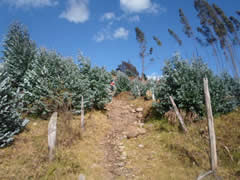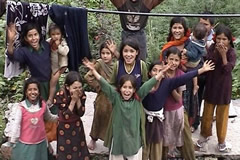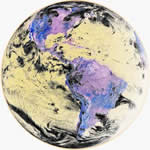Off the Road in India
By Chinmaya Dunster

[The adivasis (tribals) of Bastar in central India] are some of the most beautiful people in the world; they should be preserved. They are the only happy people, they know how to dance and how to sing, how to love and how to enjoy life. They don’t philosophize, they don’t know arithmetic, and they don’t know history and they don’t know geography and they cannot write, but they still have being, they still have grace… ~ Osho, This Body the Buddha

A few short steps, and the nightmare of diesel fumes, blaring horns and suicidal drivers is behind me. The path ahead is well worn; generations of feet and bicycle tyres have taken it before me. My own feet gladly join them.
Ahead, the hills blur into blue distance; the early morning sun is hot and dazzling. Farm workers look up from their backbreaking toil to watch me pass by. My precious video camera is poised on its tripod; at any moment perhaps a snake, an eagle, a pretty girl or a wizened old face will pause long enough for me to catch their images.
Out of all the settlements I pass, one will suddenly feel “right.” I enter the village smiling manically. How else to forestall suspicion amongst people who have been exploited for centuries, for whom outsiders have usually meant trouble in the form of police, corrupt forest department officials or rapacious bureaucrats?
“Foto! Foto!” some venturesome kid is bound to cry, seeing my camera. While here in the North, my Hindi is good enough to communicate; down South in Kerala I have to bring an interpreter. But the universal language of smiles is already in operation. I point my camera the child’s way, and instantly he is joined by others, giggling excitedly. Now comes the trick: I turn the LCD display outwards so they can see themselves on screen as the film records. The fun of jostling for position will last for hours, and when it runs thin, a silly song and dance I begin will get them dancing and roaring with laughter. If I’m lucky they’ll start up a song of their own. How beautiful their faces are: healthy skin, glowing eyes, white (if uneven!) teeth! And how immediate their trust and welcome to a stranger!
 Photo: Chinmaya Dunster
Photo: Chinmaya Dunster “Off the road” peoples, especially tribals, still have a tradition of entertaining themselves in the absence of TV; they still know how to sing and dance. Pretty soon the mothers carrying babies and the old folk are out to see what all the fuss is about and begin to see the funny side of it. They shy away from the camera at first, but who can long resist seeing themselves on screen? After a while most drift off to their various tasks and ignore me as harmless.
A uniformed Forest Department official shows up, on his guard. Who knows who this crazy foreigner might be? He’ll need a little attention, his questions answered, but these are mostly good people, underpaid and overworked, and they need a little entertainment too in their humdrum days. We share a bidi(cigarette); someone brings us milk less tea. The children are all scrunched up hilariously around the camera, which is replaying the footage I have just taken. I hand out raisins and cashew nuts all round. Big, grave eyes on the tiniest kids greet these new marvels of taste. Now we are joined by their older brothers and sisters arriving home from school. The film is rewound and shown again; some youths start up a new Bollywood-inspired dance and try out their few words of English on me.
All too soon it will be dusk, and my camera will be useless. Already the cooking fires are being lit and the menfolk are carrying their tools back from the fields, their dusty faces serious, the cares of the world etched into them. It’s harder to catch a man smiling the way the children and women do-- after all, they have the task of providing the next meal.
 Photo: Chinmaya Dunster
Photo: Chinmaya Dunster Time for me to make my way back to the car, a hotel, a city, where in a box of a room I’ll replay the day’s filming, my heart warm, my eyes glistening with tears and my grin almost tearing my cheeks open. I love these people! I’ll go back whenever I can and show them the little films they’ve become stars in, and which people all over the world are watching on the internet.
Sometimes, if I know what I can expect to find, I’ll take my guitar with me and cook up some chords that the children can sing their songs to. (“Twinkle Twinkle Little Star”, by the way, seems to have made it into some of the remotest corners of the subcontinent!) Sometimes I’m off the road for days, staying in forest bungalows, putting up a tent, or in dry areas in dry season, sleeping under the stars.
At the end of the day, after the goodbye waves, apart from a handful of raisins and cashews, this is the sole give and take between them and me: our smiles.
A bit of background
The Forest Department protects almost a fifth of India’s area, including all the wildest bits. They function as a police force, a social service, a wildlife protection agency and the intermediary between forest people and the outside world. I do not recommend going into these areas without their permission.
India’s rural areas are beset with a multitude of problems apart from the obvious one of extreme poverty. There are Naxalites (armed Maoist revolutionaries) throughout Eastern and Central India; Islamic extremist training camps and caste-based private armies waging vendettas in the North; and wildlife poachers and plain old fashioned bandits in the South. Knowing where not to go is vital, and I depend on friends and friends of friends to introduce me to an area.

Elephants are the single greatest danger to humans in India’s forests. I never venture into elephant territory on foot without a tribal guide and/or Forest Department escort. (As for tigers –forget them! There are less than 2000 left, almost all deep inside National Parks, so what chance has anyone got of running into a hungry man-eater?). It is good to be able to identify the four common poisonous snakes of India, and to tolerate a few leech bites in damp areas. Otherwise India’s jungles are remarkably free from pests.
Osho’s quotes on adivasis are sadly mostly outdated now. In the ‘60s when he visited them there was still a chance that, if outsiders kept away, they could preserve their innocent lives without education, modern healthcare or money. Alas, the outsiders-- loggers, mining companies, squatters and missionaries, both Christian and Hindu-- could not keep away, and in a few short years their traditional ways of life virtually disappeared. Today their only hope is to join the mainstream, especially through education, and to their credit, the Tribal Affairs departments of the government have made excellent progress in some states. Most of the tribal kids I meet enjoy school and see it as their only hope for a better life, free of exploitation. The thing they badly need is respect: “junglee” is still a term of abuse amongst urban Indians. My hope is that, in my limited way, by giving away my films for free, I can contribute to spreading a message of respect and appreciation for them and their way of life.
To find out how you can help or donate, check out the Avani website www.avani-kumaon.org or contact [email protected].
Smiles from Off the Road
About the author

Chinmaya Dunster is a world-renowned musician, writer, artist and filmmaker. He traveled from England to India in the 1970s, where he fell in love with Osho, the sarod and Indian classical music. Over the next several decades, he explored the crossroads between Indian classical and various Wetern musical traditions, released more than a dozen CDs, and created films dedicated to spreading a message of conservation in India. He currently lives with his family in New Zealand.
For links to Chinmaya's music, films and current projects: www.chinmaya-dunster.com
Did you like the article? Subscribe here to our New Article Email Alert or RSS feeds.
Sharing is caring! Don't forget to share the love, and keep the conversation going by leaving a comment below:
Advertisement
